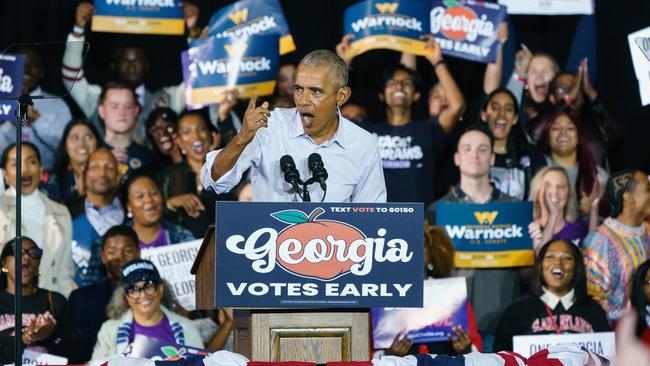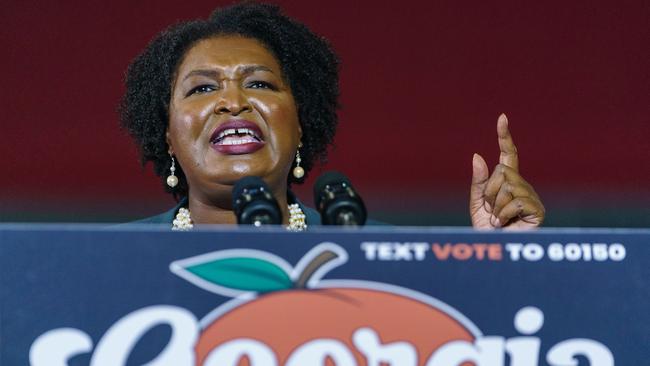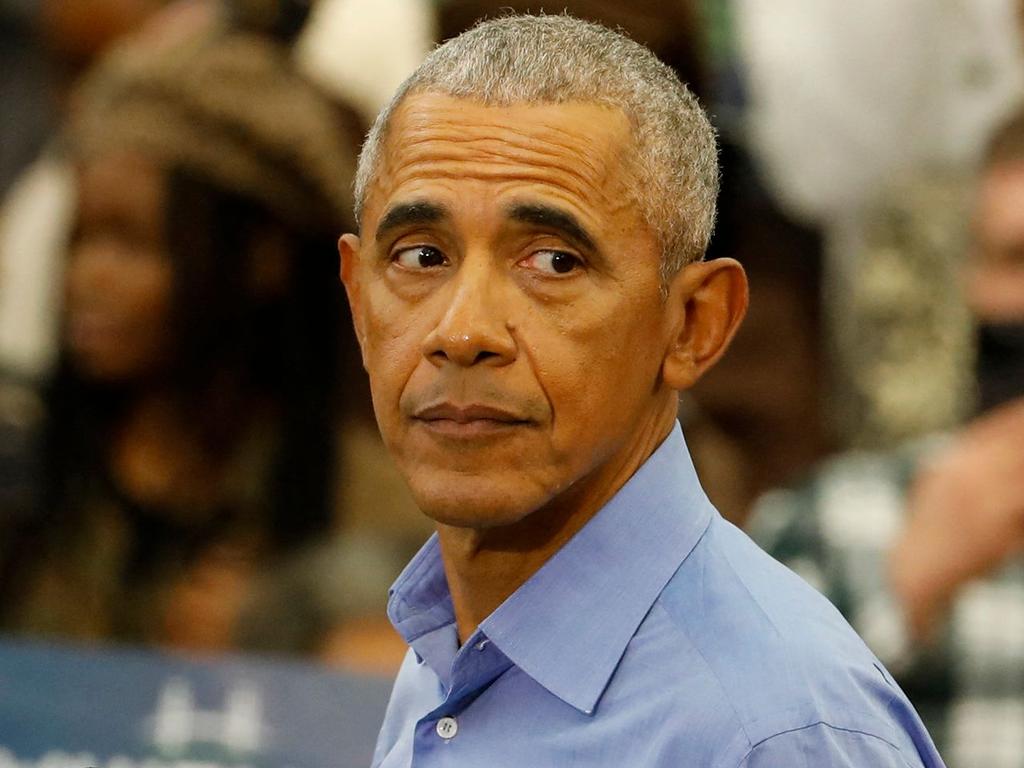US midterms: Democrats bring out the big guns
I’d written off the Democrats’ chances in next Tuesday’s US midterm elections — until I went to a Barack Obama rally in Atlanta.

Democrats are defending wafer-thin margins in congress, and polls and betting markets alike increasingly are pointing to a wipe-out for the ruling party, especially in the US House of Representatives where the Speaker’s gavel would pass to Donald Trump-backed Republican house minority leader Kevin McCarthy.
That would be a vindication for the former president, who stridently backed many of the Republican congressional and gubernatorial candidates now in the box seat to win their races, including former college football star Herschel Walker in Georgia, television’s Dr Mehmet Oz in Pennsylvania and former television news anchor Kari Lake in Arizona.
Even Republican Senate candidate and retired US Army brigadier general Don Bolduc, who no one thought had the slightest chance in New Hampshire two months ago, was ahead of Democrat incumbent senator Maggie Hassan in a Saint Anselm College poll released this week.
But the Obama rally was one slick operation, testament to the extraordinary grassroots organising power of the modern Democratic Party and a reminder not to write off the incumbent party just yet. When it comes to getting the vote out, parties of the left, thanks to their union links and stricter party organisation, typically excel.
Traffic around the Georgia International Convention Centre at College Park, where Obama was giving the first of a series of rallies around the nation in a last-minute political blitzkrieg to help his struggling party, was in gridlock as thousands of people from across the state joined a massive queue to see their Democrat hero rally the base. From 4.15pm I queued with thousands of others for almost three hours, waiting to pass through security to see the first African-American US president, as planes roared like clockwork overhead in and out of Atlanta’s international airport, the busiest in the world, just next door.
The event was as much a dance party as a political rally. A picture-perfect group of supporters arranged choir-style on a stage waved placards as they grooved away with the audience to Salt-N- Pepa’s Push It, Run DMC’s It’s Like That and other hits designed to pump up the crowd. Not until 7.15pm did Jon Ossoff, the 35-year-old Democrat senior senator for Georgia, take the stage, followed by Stacey Abrams, the Democrat candidate for Georgia governor; Baptist pastor and junior senator for Georgia Raphael Warnock; and finally the former president, whose powerful communication skills showed no sign of decline.
Georgia, the eighth most populous state in the US with almost 11 million people, is the new Florida, the national bellwether, one of about six Senate races considered close enough to go either way next Tuesday.
“I’m not here for Barack, I’m here for Stacey,” Kamala Lyon, a 50-year-old social worker from Atlanta, told me during the long wait to get inside the convention centre.
“Stacey Abrams, I think she got cheated,” she added, referring to the unsubstantiated claim by the former minority leader of the Georgia House of Representatives that her first tilt at the state governorship in 2018 was stolen.
Abrams, an articulate Yale law graduate who was once seen as a potential future national leader of the Democrats, has built a high profile but appears poised to lose a second time against incumbent Brian Kemp, the Republican who earned Trump’s enmity for refusing to “find votes” to overturn the 2020 presidential election.
“So much black excellence in this city, if it’s going to happen it will happen here,” Wendy Taberon, 63, said, enthusing about the “history-making spectacle of Warnock, Stacey and Barack all on the same stage”.
A quick walk around downtown Atlanta reveals the depressing extent of (almost exclusively black) homelessness. The legacy of slavery and segregation remains raw in Georgia.
“This is a man who lies about the most basic facts of his life … We all saw it with our own eyes. He wears his lies, quite literally, as a badge of honour,” Warnock said, referring to Walker, his rival for Georgia’s second Senate seat.
Walker, the former college football star picked by Trump, has become embroiled in several scandals over his less than truthful claims about his past relationships, including paying a former girlfriend to seek an abortion, and employment history.
Warnock, senior pastor at the same Ebenezer Baptist Church that catapulted civil rights leader Martin Luther King Jr to national fame in the 1960s, speaks with the same mellifluous cadence as his church predecessor. He’s now an underdog in the Senate race but could well hold the coveted seat.
Obama took the stage last, and the crowd roared “yes, we can” – his 2008 campaign slogan – as the former president, the only person to mention Biden in his remarks, launched into a 35-minute attack on the Republican candidates.
“There is very little evidence that he has taken any interest, bothered to learn anything about, or displayed any kind of inclination towards public service,” Obama said, taking aim at Walker, whom he called a “celebrity who wants to be a politician – and we’ve seen how that goes.”
“Don’t boo, vote,” Obama urged repeatedly, keenly aware that turnout matters greatly in a nation where voting is optional and relatively complicated compared with Australia.
Almost 24 million people across the US had already voted as of Tuesday this week, outpacing the 2018 tally at the same point, according to Catalist, a business that tracks early voting for the major parties. In Arizona, more than 75 per cent of voters vote early.
“The voting thing matters, oh absolutely; my ancestors died for this, for us to have a right to vote, this is the most important thing for me,” Lyon told me.
For all the attempts to shore up faith in elections since 2020, the sad fact is next week’s poll will likely see a resurgence of disputes.
On Tuesday, Pennsylvania’s highest court, in a win for Republicans who brought the case, ordered officials to disallow mail-in ballots that had been marked with the wrong date, which could lead to thousands of votes set aside in close races next week.
On the same day, a federal judge ordered a group called Clean Elections USA, which said it wanted to monitor ballot drop boxes, to stay at least 75 feet (almost 23m) away from them following complaints the group had been intimidating voters.
Concern about Georgia’s voting integrity reforms, which repeatedly have been branded Jim Crow 2.0 by the President and top Democrats, motivated a wide cross-section of the crowd at the rally. Jeff Marly, 54, a 22-year Atlanta resident who oversees aircraft maintenance at Atlanta airport, said Democrats’ policies to reduce the price of insulin mattered the most to him this election, but he brought up election integrity unprompted.
“And the voting restrictions, Republicans are making it more difficult for Democrats to vote,” Marly told me.
Last year Georgia’s Kemp government slashed the number of drop boxes (not used in Australia) and beefed up voter ID requirements.
The final weeks of the campaign haven’t gone well for Democrats. The White House boasted on social media on Tuesday that seniors were about to receive the biggest increase in their government pension payments “in 10 years through Mr Biden’s leadership”, before deleting the tweet a few hours later after being fact-checked by media outlets.
The administration had increased Social Security payments by 8.7 per cent to keep pace with inflation, which has been at a 40-year high for seven months in a row. The Federal Reserve lifted the benchmark interest rate by another 0.75 percentage points to 4 per cent on Wednesday, the highest level since 2008, helping keep the typical US 30-year fixed home loan interest rate above 7 per cent, more than double the level of last year.

Republicans have campaigned mainly on the high inflation, rising crime and, to a lesser extent, empowering parents in relation to school curriculum, while Democrats have focused on abortion rights, the January 6 Capitol riot last year and the risk of “semi-fascism” should Republicans backed by Trump win. Biden gave a second speech in the US capital on Wednesday warning voters US democracy could fall if Trump-backed Republicans – some of whom Democrats had helped to win their primary elections in the hope they would make it easier for Democrats to win at the midterms – succeeded next week.
According to PredictIt, the most widely quoted political betting agency in the US, Republicans have a 73 per cent chance of winning the Senate, up from 45 per cent a month ago, and a 91 per cent chance of retaking the house. The campaign movements of the two major parties’ biggest stars suggest Democrat strategists are as worried as Republicans are confident. Obama has hit the hustings in the closest states – Arizona, Nevada, Wisconsin and Pennsylvania – while Biden has spent significant time in New York, Michigan, Maryland and Florida, states that aren’t considered close.
Florida’s Republican governor Ron DeSantis flew unexpectedly to New York to campaign with Lee Zeldin, the Republican candidate for governor there, suggesting the party’s top strategists think the 42-year-old congressman has a shot at toppling incumbent Kathy Hochul in the deep blue state.
Emily Williams, 24, a science student who had just moved from Alabama to Atlanta, said she was “doing her civic duty” by attending the Atlanta rally.
“Abortion rights for sure, that’s a big issue, and student debt forgiveness,” she said, conceding Biden was weighing on Democrat support across the nation.
Well-meaning, politically active Americans who would probably agree on 90 per cent of policy subjects remain bitterly divided days before the first national election since Trump’s loss in 2020.
“We got to be able to talk to one another, everyone is angry, everyone is mad. It used to be that way back in the day but we could still talk to one another,” Lyon said. “Daughters and fathers are not talking to each other, mothers and sons are not talking, this is crazy.”
The two-party system combined with a 24/7 mainstream media, and a relentless, hyper-partisan social media that amplifies and exaggerates every difference will ensure US politics remains crazy for a while yet.






Until I attended a Barack Obama rally on Friday night in Atlanta, Georgia, I’d written off the Democrats’ chances in next Tuesday’s midterm elections, which could spell the end of Joe Biden’s ability to pass legislation or make major appointments in the second, and perhaps final, two years of his presidency.